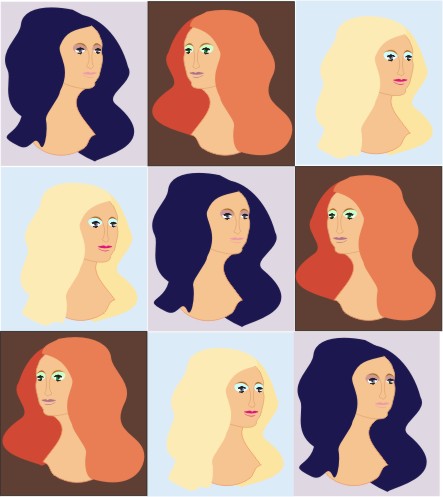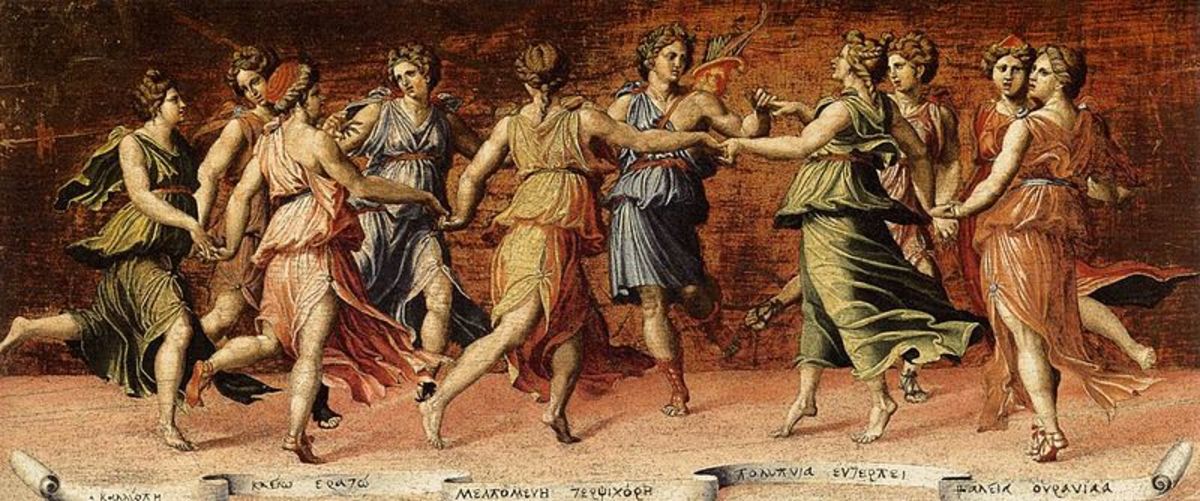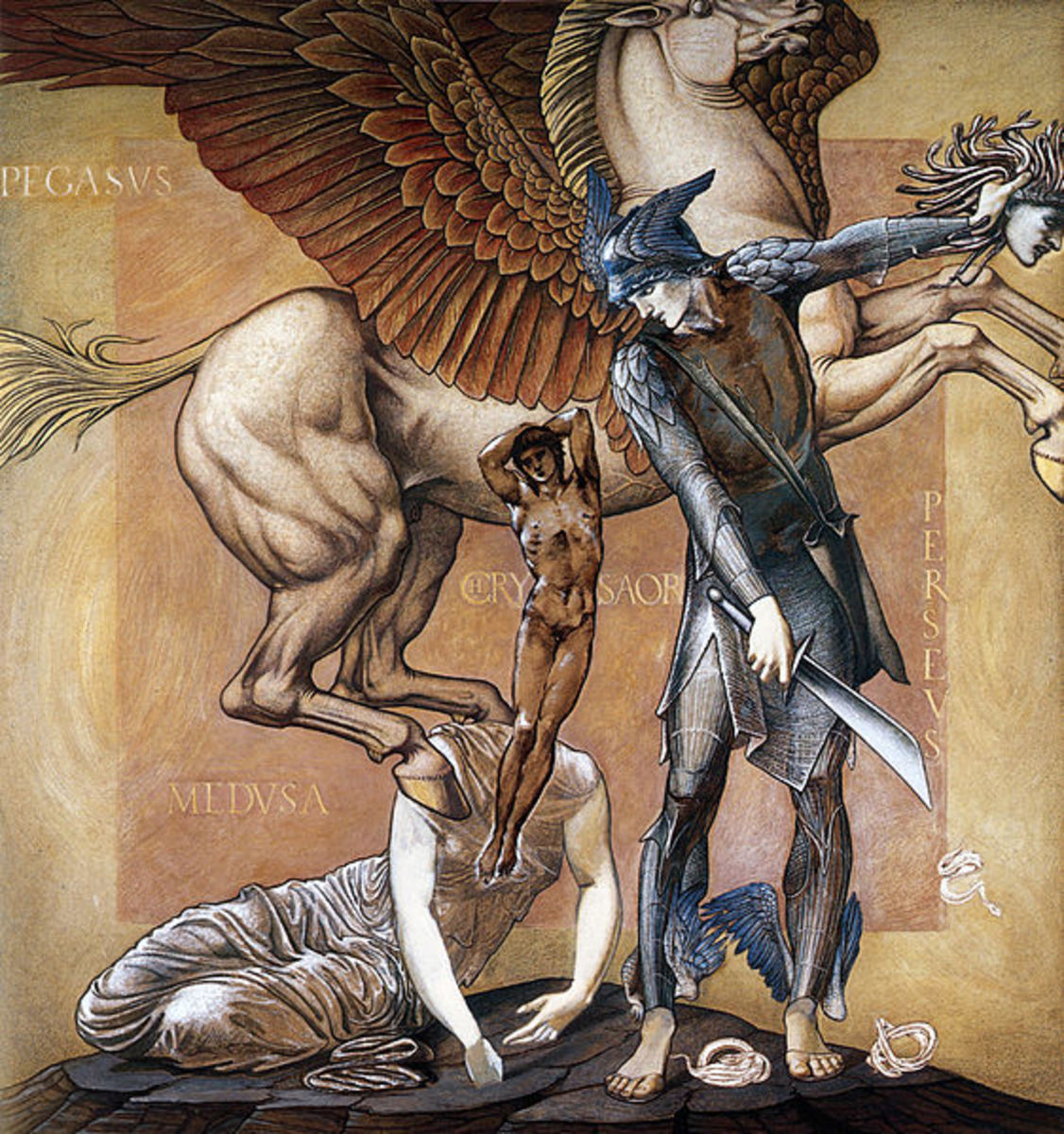Muses Mine: Who They Are And What They Do For Me

Get To Know Your Muses Now
Where’s the poet, show him! Show him! Muses nine, that I might know him (from The Poet, by John Keats.
Many people often wish that they were “better” at doing something, be it math (for helping children with homework, possibly), improving performance in a sales’ or other job involving targets, or just want to be better at remembering things.
For many years, I had heard of the nine Muses of Greek mythology, with only a vague notion of who they were and what they stood for - something about inspiring art, music and poetry, and that is as far as it went. I hardly thought this mattered until a few years ago when I heard about Leonard Wheatcroft (1627-1706), a poet who silenced his critics by reciting all of the Muses’ names and what their purposes were. Ashamed, I went and read about them. In Greek myth, the Muses were the daughters of Zeus and Mnemosyne or “memory”. They could all sing beautifully, possessed eloquence of speech and were steeped in classical knowledge. In addition to these common qualities, they each had a special attribute. The accepted number of Muses and their exact attributes has varied throughout the different ages in all parts of Greece. However, by classical times, scholars generally accepted the following roll call:
Kalliope was the Muse of epic poetry and the mother of the Sirens.
Scholars suppose Polhymnia to have invented the lyre; thus she is Muse of hymns and Roman pantomime. However, her attributes vary and include dancing, geometry and history. She is also reckoned to be the mother of Orpheus by father Oeager.
Erato was the Muse of lyric poetry; especially love poetry. She was also a prophet-ess, inspired by Pan.
Thalia was the Muse of comedy and light verse, and a lover of Daphnis before he succumbed to the charms of Chloe.
Euterpe was skilled in playing the aulos or double pipe, a kind of flute.
Kleio was the history buff among the Muses.
Melpomene was the Muse of tragedy.
Terpsichore was the Muse of choral dance, and lover of the river-god Achelous.
Ourania was the Muse of astronomy.
In the years since taking the trouble to learn about them, I have worked through many difficult situations by calling upon my own family of Muses; Hope, Faith, Prosperity, Love, Confidence, Intellect, Creativity, Laughter and Beauty. Creating my own Muses was important; after all, I had no use for a Muse of Tragedy – unless I had to write a political speech, that is. By consulting my Prosperity Muse, for example, I have gained several valuable work leads. I have also solved an annoying skin problem after several desperate exhortations to my Beauty Muse.
When trying to explain this to people, I have often been dismissed as indulging in “nonsense” and that my system is “imaginary”. Well, maybe these exercises are imaginary, but there is nothing nonsense about the benefits they have brought to me. Our Muses are not the supernatural beings of Greek mythology, but underdeveloped areas of our own minds and the reservoir of latent skill that we all have access to but have been unable to find through being too busy working for a living, bringing up children and other reasons. Many people discover a hidden skill or resource during a life crisis but my advice is to not wait until a crisis, to get to know your Muses well in advance of such a thing. By doing this, you will earn the right to draw upon their wisdom and knowledge when you most need it. So, how does it work?
The best time for the exercise is early in the morning but if this is not possible, evening or nighttime is fine. Whatever, choose a time of day when you are alone and know you will not be disturbed. Sit or lie in a comfortable position but beware of getting too comfortable as there is a danger that you might fall asleep. At this point, readers who meditate will recognise these conditions as prerequisite to successful meditation. In fact, the Muse exercise is a most effective end to a meditation session. If you do not meditate, just use the exercise to fall into the correct state of relaxation.
When you are comfortable, close your eyes and imagine your entire body filling up with pale-blue liquid, starting with the top of your head and moving downwards. Imagine the liquid moving to every area of your body; neck, torso, limbs, fingers and toes. When your body is “full”, wiggle about, enjoying the relaxation experience. Now, you are ready to engage in conversation. Think of a problem or difficulty you have encountered recently. Even if you have solved it, use the circumstances as a pointer to finding your first Muse. For example, suppose that you had needed money, say something like: Prosperity Muse, I am missing you. Please come to me.
Now picture a figure, no matter how shadowy, arriving and sitting beside you. To make the situation more tangible, have the newly fledged Muse perform some innocuous task, like patting his or her hair or smoothing his or her clothes. Some people find that the Muse appears “ready made”. Other people need to connect with their Muse for a while before she or he appears clearly. Your Muse is imaginary, of course, but you can still give him or her the face of a "real” person. If this is the case, it is important to utilise the face of someone you like. This may seem obvious, but an extraordinary number of people spend hours in imaginary locked battle with bank managers and other people they have been in contention with. Your bank manager or boss may have admirable qualities, but it is difficult to connect with someone that you haven’t seen eye to eye with. Once you have created a Muse that you are comfortable with, it is time to begin talking and your first conversation could run something like this: Prosperity Muse, I like you but I don’t see enough of you. Could you please explain to me the secret of longer- term prosperity and financial security?
Do not leave it at that. Get to know your Muse. Ask questions about his or her life. Imagine the two of you dining together. Play games like chess that involve strategy and skill. As time goes on, you may find your Muse telling you that you need more qualifications to earn a higher salary. Now, it is time to call in the Learning Muse and go through the whole process again. Some people need to call on a Confidence Muse, Happiness Muse – the progress differs for everyone. As your Muse family grows, you will find them interacting with one another, for example, having discussions on your behalf. This is all to the good. What you learn from your Muses will spill into everyday life. You may find yourself picking up books you never thought of reading and finding useful information inside. You may find yourself approaching “important” people at gatherings, something you never had the confidence to do before, and gaining valuable work leads. Again, the progress is different for everyone.
How many Muses will you need? Again, this differs for everyone; you don’t have to stay with the classical nine. In theory, you can have as many as you like but in practice, it is better to confine your group to a number you can get to know well. Call up your Muses routinely; the more you get to know them, the better. After all, you don’t wait until you are in crisis before knocking upon the door of a good friend.
In the longer term, you will find your Muse profile changing. For example, you may want to “retire” your Prosperity Muse and replace him or her with the Greater Creative Endeavour Muse. You may want to put work in the background for a while and bring forth a Love Muse to help pursue a relationship. Again, this progress is different for everyone. Whether you tell your friends about your Muse venture or not, is up to you. My advice is to wait until you have gained a few benefits from the process. By then, no one will be able to dismiss your experiences as “nonsense”. To sum up, my Muses Nine have brought many tangible and intangible advantages to me in the time we have been in contact. I never want to be without them.
Sources
The Complete World of Greek Mythology by Richard Buxton, Thames and Hudson.
The Penguin Dictionary of Classical Mythology, edited by Pierre Grimal






